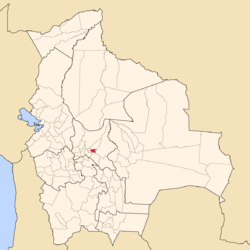Arani Province (original) (raw)
From Wikipedia, the free encyclopedia
Province in Cochabamba Department, Bolivia
| Arani | |
|---|---|
| Province | |
 Parqu Qucha, one of the lakes of the Vacas Municipality Parqu Qucha, one of the lakes of the Vacas Municipality |
|
 Location of the Arani Province within Bolivia Location of the Arani Province within Bolivia |
|
 Provinces of the Cochabamba Department Provinces of the Cochabamba Department |
|
| Coordinates: 17°37′S 66°05′W / 17.617°S 66.083°W / -17.617; -66.083 | |
| Country |  Bolivia Bolivia |
| Department | Cochabamba Department |
| Municipalities | 2 |
| Cantons | 4 |
| Foundation | November 24, 1914 |
| Capital | Arani |
| Area | |
| • Total | 867 sq mi (2,245 km2) |
| Population (2024 census) | |
| • Total | 19,836 |
| • Density | 23/sq mi (8.8/km2) |
| • Ethnicities | Quechua |
| Time zone | UTC-4 (BOT) |
| Area code | BO.CB.AR |
Arani is a province in Cochabamba Department, Bolivia. Its capital is Arani, situated about 53 km from Cochabamba. Arani is known for its bread and its artisan wickerwork.
Some of the highest mountains of the province are listed below:[1][2]
- Chawpi Urqu
- Chullpa Ch'utu
- Ikma Mayu
- Inka P'iqi
- Iskay Wasi
- Jatun Llallawa
- Jatun Punta Mayuq
- Jatun Salla
- Juch'uy Llallawa
- Kuntur
- K'illi K'illi
- Llusk'a Llusk'a
- Mayu Urqu
- Murun Pampa
- Ñuñu Urqu
- Puka Chanka
- Pukara
- Phaqcha Urqu
- Qucha Quchayuq Urqu
- Qullpa Qucha Urqu
- Qullu Mayu
- Qutu Rumi
- Q'illu Q'asa
- Salla Punta
- Salla Q'asa
- Siqina Urqu
- T'utura Pampa
- Urqu Punta
- Wanu Wanu
- Waylla Qucha
- Yana Qucha
The province is divided into two municipalities which are further subdivided into four cantons.
| Section | Municipality | Inhabitants [3] | Seat | Inhabitants [4] |
|---|---|---|---|---|
| 1st | Arani | 11,542 | Arani | 3,512 |
| 2nd | Vacas | 12,511 | Vacas | 650 |
Arani Municipality consists of three cantons, Arani, Pocoata and Collpaciaco. Vacas Municipality is not further subdivided, so Vacas Canton and Vacas Municipality are identical.
The people in the Arani Province are mainly indigenous citizens of Quechua descent.[5]
| Ethnic group | Arani Municipality | Vacas Municipality |
|---|---|---|
| Quechua | 87.2 | 94.4 |
| Aymara | 0.4 | 0.2 |
| Guaraní, Chiquitos, Moxos | 0.2 | 0.0 |
| Not indigenous | 12.1 | 5.4 |
| Other indigenous groups | 0.1 | 0.1 |
The languages spoken in the Arani Province are mainly Quechua and Spanish. The following table shows the number of those belonging to the recognized group of speakers.[5]
| Language | Arani Municipality | Vacas Municipality |
|---|---|---|
| Quechua | 10,347 | 11,662 |
| Aymara | 76 | 39 |
| Guaraní | 5 | 2 |
| Another native | 5 | 2 |
| Spanish | 7,082 | 4,236 |
| Foreign | 49 | 11 |
| Only native | 3,902 | 7,540 |
| Native and Spanish | 6,467 | 4,131 |
| Only Spanish | 615 | 106 |
Festivals and Fairs:
- August 14–15: Saint Isidore the Laborer in Qullpayaku, 2 days
- August 24–25: Virgen la Bella in Arani, 2 days
- September 20: Farmers' fair in Tacopaya, 1 day
- 3rd week in November: Bread fair in Arani, 1 day
- December 4: Saint Barbara in Vacas
Other tourist attractions include the church of Saint Bartholomew (San Bartolomé) in Arani, built in 1610, which is dedicated to the Virgen la Bella, and the lakes in Vacas Municipality: Parqu Qucha, Asiru Qucha, Junt'utuyu, Pilawit'u, Qullpa Qucha and Yanatama.
Vacas with two of its lakes: Pilawit'u on the left and Qullpa Qucha in the center
San Bartolomé church in Arani which keeps the shrine of the Virgen La Bella
The giant Puya raimondi plants grow on Khurupampa mountain in the Vacas Municipality.- Ismael Montes Teacher Training College
- ^ Bolivian IGM map 1:50,000 Vacas 6441-II
- ^ "Vacas". INE, Bolivia. Archived from the original on March 4, 2016. Retrieved March 4, 2016.
- ^ www.ine.gov.bo Archived August 25, 2007, at the Wayback Machine
- ^ "world-gazetteer.com".[_dead link_]
- ^ a b obd.descentralizacion.gov.bo/municipal/fichas/ (inactive)



